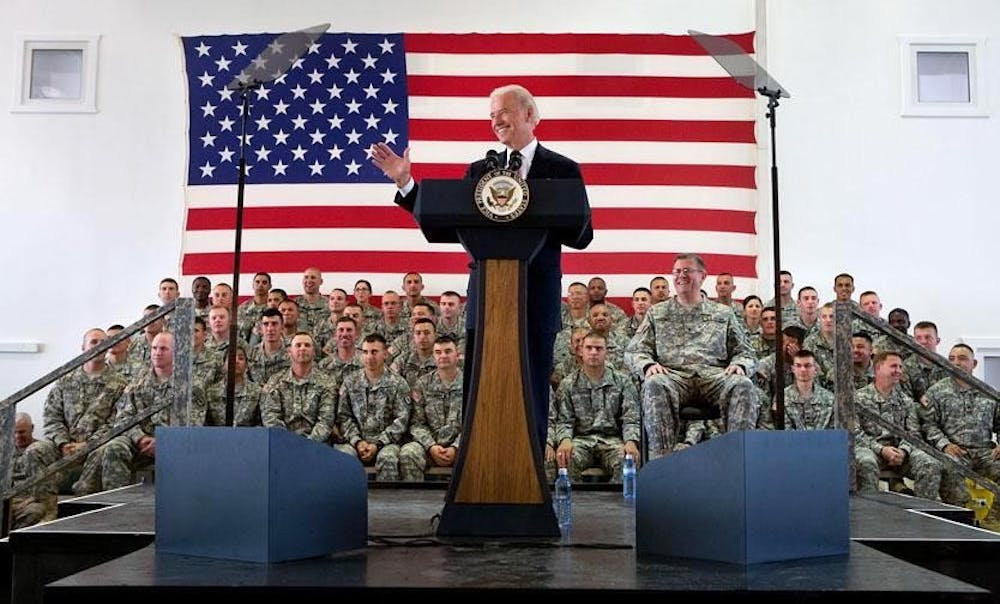中文版请点击此处
I’ve always voted Republican, but last week I voted absentee for Joe Biden and Kamala Harris.
I was raised in a loving family with moderately conservative values in a suburban neighborhood on the outskirts of our nation’s capital. In good ole D.C. fashion, my neighborhood is one where a former Republican senator lives down the street from someone who worked for the Obama administration, whose kids play with the kids of a lobbyist for the National Rifle Association. As I drive our streets, red and blue plastic signs stick out proudly from neighbors’ lawns with messages of “ByeDon” and “Make America Great Again.” Nevertheless, we all march in the same Fourth of July parades, serve the same citizen’s association, complain in the same neighborhood Facebook group and suffer the same power outages when strong winds prove too much for our decades-old power lines. Growing up, I learned to appreciate political opinions from neighbors to my left and right.
In 2012, I sat eagerly in front of the TV with my dad as we watched electoral votes roll in and shared disappointment when we realized that the Romney-Ryan ticket would fall short. In that same election year, my mom took me into the voting booth with her to re-elect our nation’s first Black president. One of my grandmothers is an immigrant. My great-grandparents were small business owners in rural parts of the U.S., and both grandfathers Army soldiers. I heard well-reasoned and well-articulated points of view from people who disagreed about how to lead our country but loved it equally.
Ever since I have been eligible to vote, I have voted Republican. I have also volunteered for Republican campaigns and worked for Republican elected officials. While I was too young to vote in 2016, I did not support President Donald Trump. Since his inauguration, I have felt somewhat politically homeless. Trump does not embody the Republican party’s values of freedom, liberty and security that inspired me to get involved in politics, and his nomination makes me question whether the Republican party prioritizes those values anymore. His divisiveness has also shifted the Democratic Party further left. Today I sit anxiously in a moderate limbo, a political desert between thriving extremism.
Admittedly, I disagree with many of Biden’s policies. However, this election is less about which candidate proposes better policies and more about who demonstrates better leadership. As I have learned in my public policy classes, the psychological phenomenon “social proof” explains the human tendency to follow the lead of others because we deem certain behaviors acceptable after seeing someone else exhibit them. Even behaviors we know are wrong are normalized once we see, read and hear about them.
Our president, the most powerful leader in our nation and world, should exhibit positive behaviors for Americans to repeat throughout their communities. That is how you ignite positive change — by bringing people together. Instead, Trump’s behavior has not only set a destructive precedent for our government’s highest office but has lowered the set of standards for the Republican Party that I only hope will eventually recover. His hateful rhetoric and Twitter attacks have also cultivated a harmful “cancel culture” on social media, as well as more divisiveness among politicians and citizens.
A president who inspires the growth in prominence of neo-Nazi and white nationalist groups and gains their unwavering support around the country is unacceptable for the United States. A president who ignores his national security advisors and makes impulsive decisions that threaten our safety is unacceptable for the United States. A president who dismisses facts and advice from public health experts on his own coronavirus task force, including Dr. Anthony Fauci, director of the National Institute of Allergy and Infectious Diseases, because they contradict his own opinions and political goals, is unacceptable for the United States. A president who intimidates fellow Republican elected officials by threatening to compromise their re-election with Twitter bullying is unacceptable for the United States and its constitutional values.
I have my bipartisan upbringing to thank in part for my courage to cross party lines and vote against Trump and for America this upcoming election. To my fellow young Republicans, there are many others who fear a future with Trump. I have sought comfort in those who have spoken up in the Former Republican National Security Officials for Biden and Republicans Voters Against Trump campaigns, as well as many individual Republican officials against Trump’s re-election.
Vote for the leader who is willing to reach across the aisle to bring us together — not push us further away from one another. Vote for the leader who will listen to his expert advisors to protect Americans. Vote for the leader who will work proudly on behalf of your BIPOC, LGBTQ+ and female friends and family. Vote for the leader who will set a good example for America, at home and abroad, because the future of our health, country and planet depends on it. Vote for Joe Biden.
Martha Gallagher is a fourth-year in the Batten School.
The opinions expressed in this column are not necessarily those of The Cavalier Daily. Columns represent the views of the authors alone.







